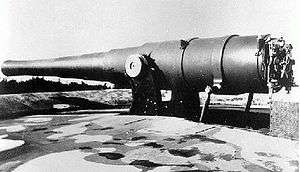Ben Buckler Gun Battery
| Ben Buckler Gun Battery | |
|---|---|
| Ben Buckler, Sydney | |
|
Disappearing gun at Ben Buckler Gun Battery | |
 Ben Buckler Gun Battery | |
| Coordinates | 33°53′03″S 151°17′04″E / 33.884195°S 151.284410°E |
| Type | Gun Battery |
| Site history | |
| Built | 1892 |
| Materials | Concrete, Brick |
The Ben Buckler Gun Battery is a fortified gun emplacement of the late-Victorian period located in the Northern Bondi locality of Ben Buckler, Sydney, Australia.[1][2]
History
The Ben Buckler Gun Battery was constructed in 1892 as one of a set of three coastal defence fortifications for Sydney Harbour, the other two being Signal Hill Battery at Watsons Bay and the Shark Point Battery in Clovelly. These fortifications were the last link in Sydney’s outer defence perimeter, which was intended to defend Sydney from bombardment by an enemy vessel standing off the coast. The fortifications built in the 1890s around Sydney's eastern suburbs were the culmination of some twenty years of construction of harbour defense installations that reflected the changing policy of the time to meet new technologies, threats and styles of warfare.
Gun emplacement
The Ben Buckler Battery is a rare, intact concrete 1890s gun emplacement, which was designed and developed for the new BL 9.2 inch (234 mm) Mk VI breech-loading 'counter bombardment' British Armstrong 'disappearing' gun. The Australian colonies bought 10 of these, three for Sydney, plus an extra barrel, four for Victoria at Fort Nepean and Fort Queenscliff, and two for Adelaide, South Australia, purchased in 1888. The Adelaide guns were never installed at Fort Glenelg and the British government bought them back in 1915. The barrel of the gun that had been installed at Signal Hill Battery survives and was on public display at the Royal Australian Artillery Museum at North Fort, North Head before the museum closed in 2010.
The Ben Buckler gun, Serial Number 7319, is the only complete 9.2-inch in Australia and was the largest gun in New South Wales. The gun barrel weighed 22 tons and it took a total of thirty-six horses to transport the barrel from Victoria Barracks in Darlinghurst to the battery in North Bondi; the transit took over three weeks.
Soon after its arrival, the gun was installed on a hydraulically operated disappearing mount. The gun was located below ground level and beneath a domed iron shield set into a wall of reinforced concrete that was ten meters in diameter. The domed metal shield that covered the pit was intended to protect the gun from incoming shells.
Once the gun was loaded, the hydropneumatic action shunted it forward and up through a slot in the shield. After discharging, the recoil mechanism forced the gun back into its pit. This protected the gun crew while loading and made the gun a very difficult target for an enemy ship to hit.
Sometime in the 1950s the army vacated the site. The government was unsuccessful in finding a scrap metal buyer to remove the gun, so it buried the gun and gave the site over to parkland. The gun's existence was forgotten until it was rediscovered in the mid-1990s by Water Board engineers planning a new pipeline. It is now classed as an architectural relic and is under the protection of the Heritage Council.
